RIYADH, Saudi Arabia (November 20) -- Kyrgyzstan was the most successful nation on day three of the Islamic Solidarity Games 2025 with three gold medals out of five on offer.
Three weight classes in women's and two in Freestyle were in action in Riyadh at the Games and Kyrgyzstan captured three gold medals with Paris Olympic silver medalist Meerim ZHUMANAZAROVA (KGZ) leading the way.
Zhumanazarova powered her way to the 68kg gold medal. Facing Svetlana OKNAZAROVA (UZB) in the final, Zhumanazarova hit a counter four-pointer to extend her lead to 7-0 before hitting a takedown and turn to finish the final 11-0.
"It was an easy tournament for me," Zhumanazarova said. "I have not wrestled well since Paris majorly due to the ankle injury I suffered."
Now that she is back to full fitness and winning, Zhumanazarova aims to compete more often year with Asian Championships, World Championships and Asian Games lined up.
"Next year, I will make sure to compete at all three major tournaments," she said.
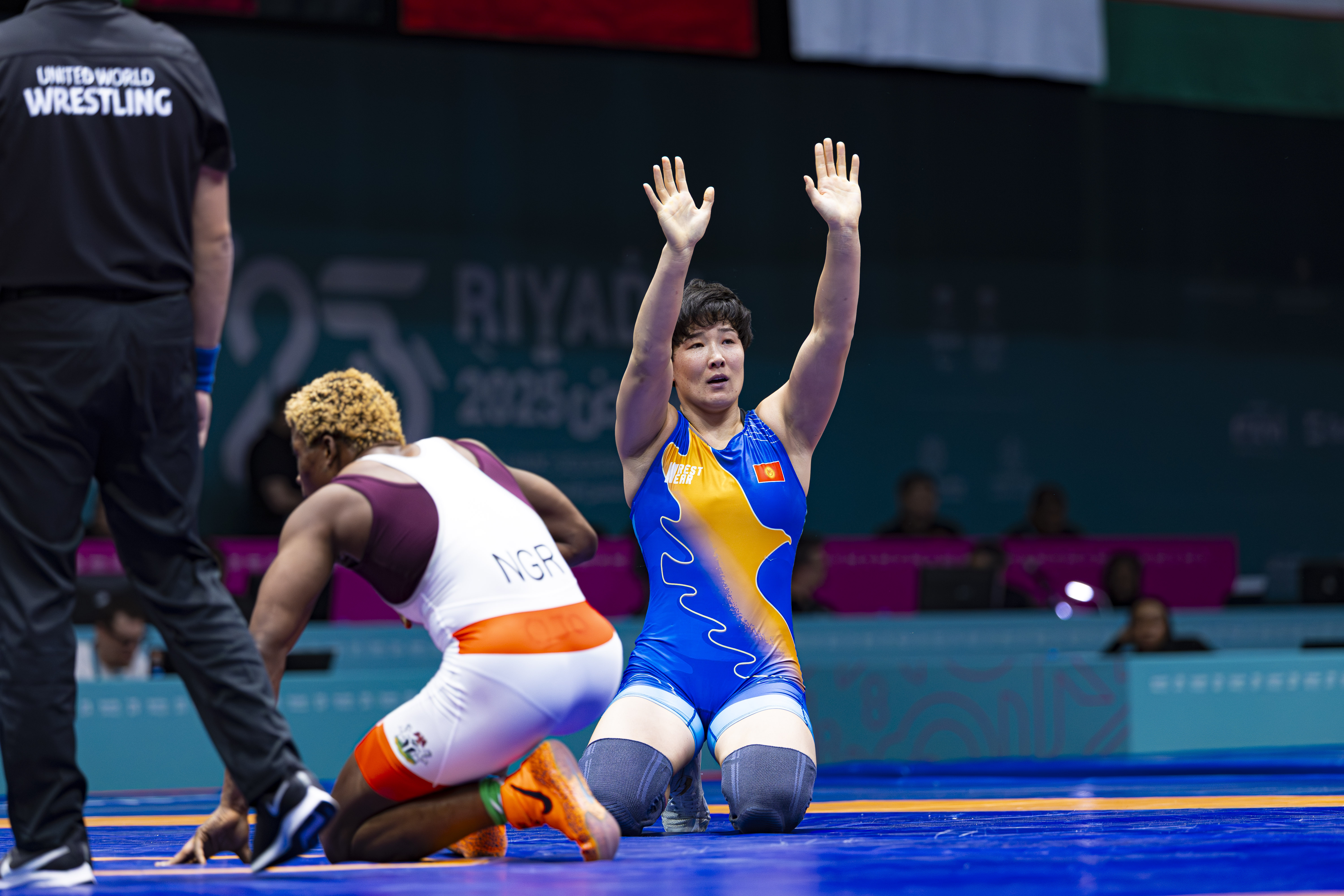 Aiperi MEDET KYZY (KGZ) celebrates after beating Damola OJO (NGR) in the 76kg final. (Photo: United World Wrestling / Kadir Caliskan)
Aiperi MEDET KYZY (KGZ) celebrates after beating Damola OJO (NGR) in the 76kg final. (Photo: United World Wrestling / Kadir Caliskan)
Joining Zhumanazarova on the top of the podium was world silver medalist and Asian champion Aiperi MEDET KYZY (KGZ) who came alive in the second period of the 76kg final against Damola OJO (NGR).
Ojo led 1-1 on criteria when she scored a stepout in the second period but Medet Kyzy scored a takedown and then moved to the legs to lock a lace and turn Ojo four times for an 11-1 technical superiority.
Medet Kyzy's gold medal was the second for Kyrgyzstan in women's wrestling, same as Nigeria. Azerbaijan and Uzbekistan finished the competition with one gold each.
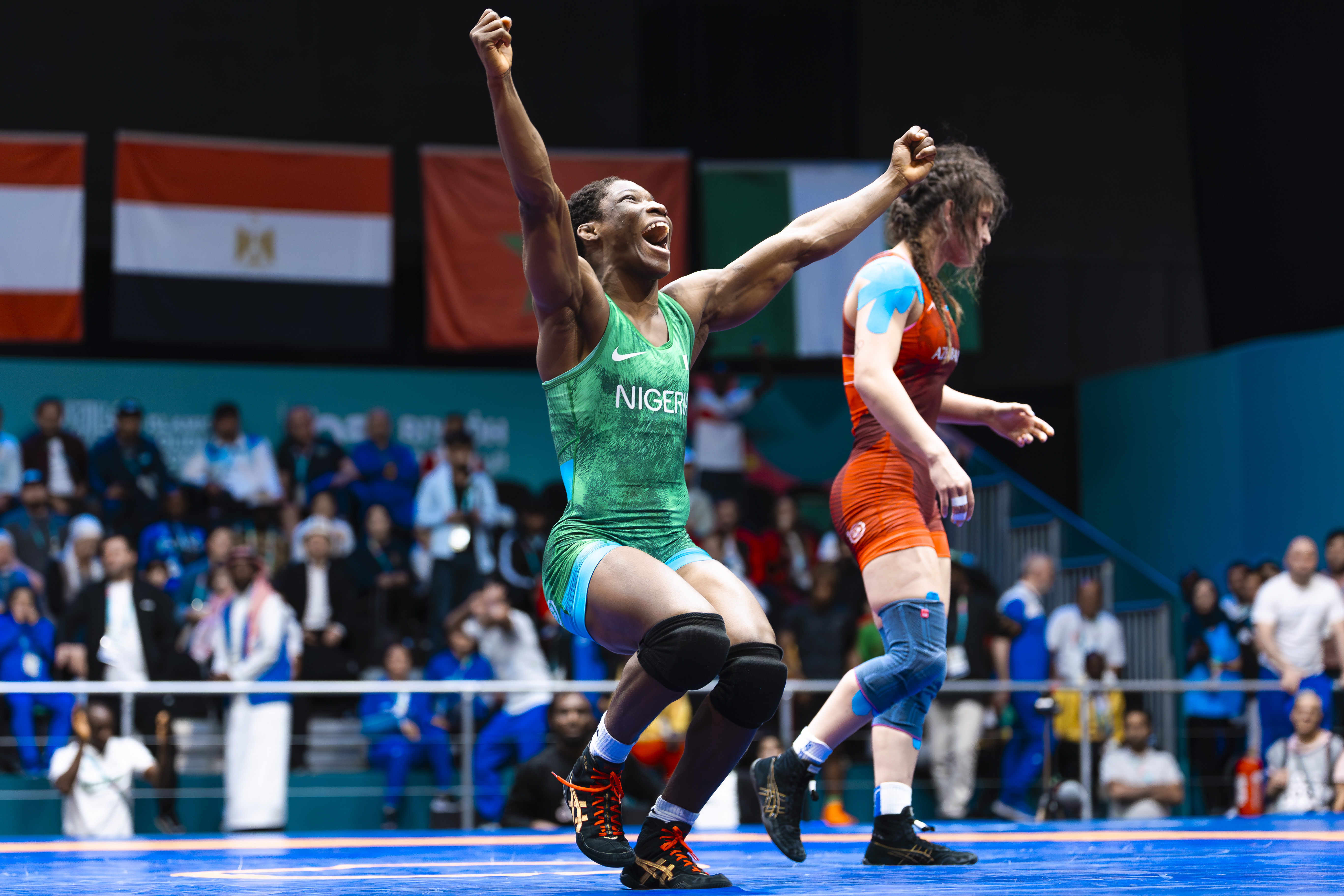 Esther KOLAWALE (NGR) defeated Ruzanna MAMMADOVA (AZE) with a last-second takedown in the 62kg final. (Photo: United World Wrestling / Kadir Caliskan)
Esther KOLAWALE (NGR) defeated Ruzanna MAMMADOVA (AZE) with a last-second takedown in the 62kg final. (Photo: United World Wrestling / Kadir Caliskan)
U23 world bronze medalist Esther KOLAWALE (NGR) needed a final-second takedown against Ruzanna MAMMADOVA (AZE) to win the 62kg gold medal. She scored a takedown when Mammadova was on the activity clock to lead 3-0 and hoped to run out the clock with that lead.
However, Mammadova got on a single-leg attack in the second period which she converted into a takedown during the Nigerian's activity period. Kolawale tried to open the fingers of Mammadova which made the referees dock on point for caution, making it 4-3 for Mammadova with 16 seconds left.
Kolawale first scored a stepout with 12 seconds remaining to make it 4-4 but Mammadova had the criteria lead because of the caution against Kolawale. But she then hit a takedown with three seconds on the clock to claim a 6-4 and the win as well.
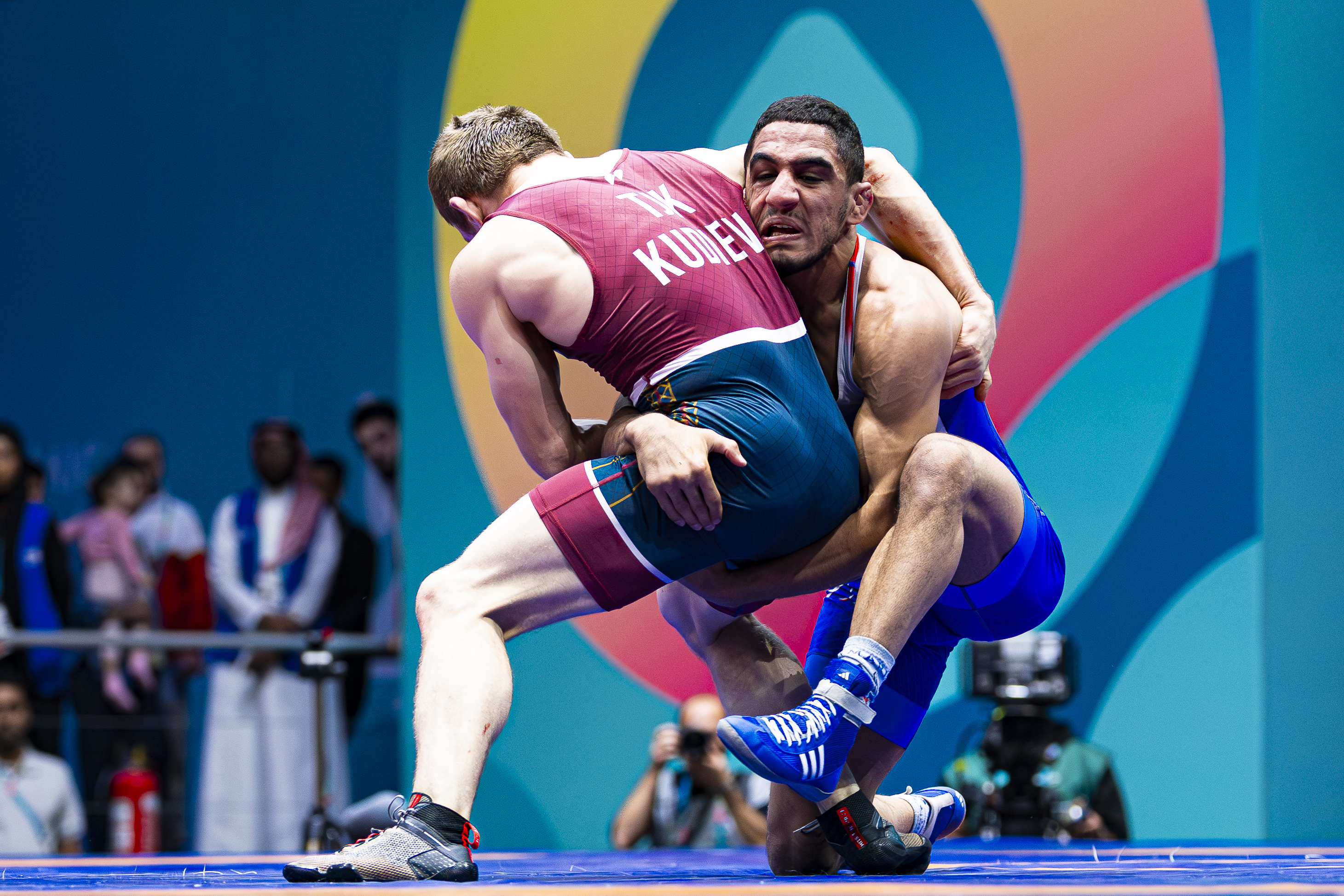 Rahman AMOUZAD (IRI) scores on Abdulmazhid KUDIEV (TJK) in the 65kg final. (Photo: United World Wrestling / Kadir Caliskan)
Rahman AMOUZAD (IRI) scores on Abdulmazhid KUDIEV (TJK) in the 65kg final. (Photo: United World Wrestling / Kadir Caliskan)
Amouzad dominates to gold
World champion Rahman AMOUZAD (IRI) had not trouble in winning the 65kg gold medal after he defeated Abdulmazhid KUDIEV (TJK), 12-2, in the final.
Kudiev gave an early scare when he scored a takedown on Amouzad to go 2-0 up but the Iranian gather himself and scored three stepouts before the break to lead 3-2. Kudiev then tried to hit a double-leg but Amouzad countered with a beautiful chest wrap throw for four points to make it 7-2.
Tajikistan challenged, asking for two points but at no point in the exchange did Kudiev manage to expose or control Amouzad who now led 8-2 for the lost challenge. Two stepouts and a takedown later, Amouzad captured the gold medal with a technical superiority win.
Earlier in the day, Amouzad faced world bronze medalist Umidjon JALOLOV (UZB) in the quarterfinals and came out on top 4-0. The win included three stepout and one point for Jalolov's passivity.
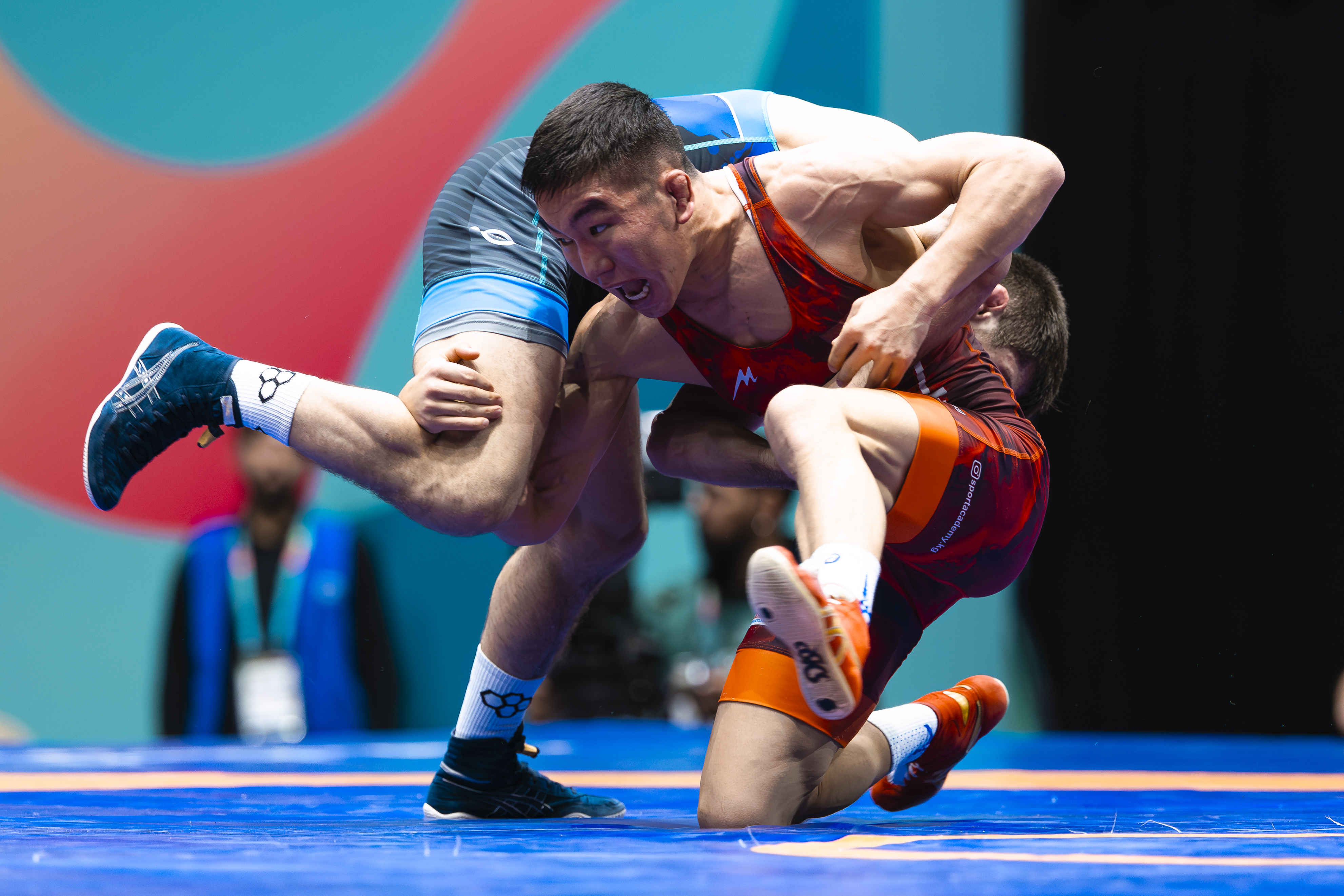 Abdumalik KARACHOV (KGZ) counters Islam BAZARGANOV (AZE) to score four points. (Photo: United World Wrestling / Kadir Caliskan)
Abdumalik KARACHOV (KGZ) counters Islam BAZARGANOV (AZE) to score four points. (Photo: United World Wrestling / Kadir Caliskan)
Kyrgyzstan won gold medals not only in Women's Wrestling but also in Freestyle as Abdumalik KARACHOV (KGZ) won at 57kg, beating Islam BAZARGANOV (AZE), 9-3, in the final.
Karachov had a field day in Riyadh as he defeated world and Olympic bronze medalist Gulomjon ABDULLAEV (UZB) in the quarterfinals before a convincing win in the final.
Bazarganov was down 2-1 with 24 seconds left in the final when he hit a strong snap on Karachov who managed to stay on his feet and countered with a duckunder and get four points.
Bazarganov got one point for reversal but Azerbaijan challenged the call, asking for four points but lost it as Karachov never came in danger. The Kyrgyzstan wrestler then scored a match-ending takedown to win 9-3.

RESULTS
Women's Wrestling
62kg
GOLD: Esther KOLAWALE (NGR) df. Ruzanna MAMMADOVA (AZE), 6-4
BRONZE: Selvi ILYASOGLU (TUR) df. Rebecca AMONGI (UGA),
BRONZE: Nigina SABIROVA (UZB) df. Aylah MAYALI (PLE), 11-0
68kg
GOLD: Meerim ZHUMANAZAROVA (KGZ) df. Svetlana OKNAZAROVA (UZB), 11-0
BRONZE: Nigar MIRZAZADA (AZE) df. Halima AKTER (BAN), via forfeit
BRONZE: Irina KAZYULINA (KAZ) df. Ndiffo AIMELDA (CMR), via fall (6-0)
76kg
GOLD: Aiperi MEDET KYZY (KGZ) df. Damola OJO (NGR), 11-1
BRONZE: Elmira SYZDYKOVA (KAZ) vs. Elmira YASIN (TUR), via fall (7-0)
BRONZE: Samar HAMZA (EGY) df. Wilita PELAGIE (CMR), 5-1
Freestyle
57kg
GOLD: Abdumalik KARACHOV (KGZ) df. Islam BAZARGANOV (AZE), 9-3
BRONZE: Ali MOMENI (IRI) df. Sayed ZAZAI (AFG), 11-0
BRONZE: Gulomjon ABDULLAEV (UZB) df. Ismael CAMARA (GUI), 10-0
65kg
GOLD: Rahman AMOUZAD (IRI) df. Abdulmazhid KUDIEV (TJK), 12-2
BRONZE: Umidjon JALOLOV (UZB) df. Ali RAHIMZADE (AZE), 8-3
BRONZE: Bilol SHARIP UULU (KGZ) df. Alibeg ALIBEGOV (BRN), 10-0



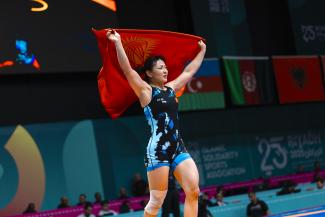
 Aiperi MEDET KYZY (KGZ) celebrates after beating Damola OJO (NGR) in the 76kg final. (Photo: United World Wrestling / Kadir Caliskan)
Aiperi MEDET KYZY (KGZ) celebrates after beating Damola OJO (NGR) in the 76kg final. (Photo: United World Wrestling / Kadir Caliskan) Esther KOLAWALE (NGR) defeated Ruzanna MAMMADOVA (AZE) with a last-second takedown in the 62kg final. (Photo: United World Wrestling / Kadir Caliskan)
Esther KOLAWALE (NGR) defeated Ruzanna MAMMADOVA (AZE) with a last-second takedown in the 62kg final. (Photo: United World Wrestling / Kadir Caliskan) Rahman AMOUZAD (IRI) scores on Abdulmazhid KUDIEV (TJK) in the 65kg final. (Photo: United World Wrestling / Kadir Caliskan)
Rahman AMOUZAD (IRI) scores on Abdulmazhid KUDIEV (TJK) in the 65kg final. (Photo: United World Wrestling / Kadir Caliskan) Abdumalik KARACHOV (KGZ) counters Islam BAZARGANOV (AZE) to score four points. (Photo: United World Wrestling / Kadir Caliskan)
Abdumalik KARACHOV (KGZ) counters Islam BAZARGANOV (AZE) to score four points. (Photo: United World Wrestling / Kadir Caliskan)
Share your thoughts.
Comments